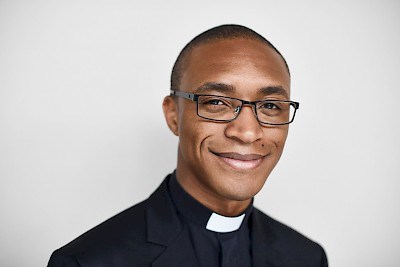
Modern Believing January 2021 Books Received
February 5, 2021
Anthony Woollard: Does it Matter if the Church Dies?
February 17, 2021Jarel Robinson-Brown was quickly and widely denounced for his now-famous tweet. Since then others have leapt to his defence, arguing that the tweet was correct, or not that bad, or that it would not have been condemned if he had not been black and gay.
This post asks why so much fuss was created about it. What is really at stake?
What happened
Captain Tom Moore became famous for raising £32 million for the National Health Service by walking 1000 laps round his garden during the first lockdown. He died a few days ago at the age of 100. A national ‘clap’ for him was organised, like the earlier claps for the National Health Service.
Jarel Robinson-Brown, a former Methodist minister now training for ordination in the Church of England, tweeted:
The cult of Captain Tom is a cult of White British Nationalism. I will offer prayers for the repose of his kind and generous soul, but I will not be joining the ‘National Clap’.
That’s what the fuss is about. Nothing else. Yet change.org has a petition, supported by UKIP, to remove him from office. The Diocese of London saw fit to issue a statement:
Jarel Robinson-Brown’s comments regarding Captain Sir Tom Moore were unacceptable, insensitive, and ill-judged. The fact that he immediately removed his tweet and subsequently apologised does not undo the hurt he has caused, not least to Captain Tom’s family. Nor do Jarel’s actions justify the racist abuse he is now receiving.
A few days later the mood had changed. The Bishop of London issued a new statement more critical of the abuse directed at him. By this time Robinson-Brown had removed the tweet and issued a public apology for it.
So why did that tweet generate such strong feelings?
Free speech opposed by upholders of free speech
If you want to know why so many people think he shouldn’t be ordained, just because of that one tweet, it’s worth reading what Pink News has to say. The tweet
was notable for the visceral hatred it attracted online, much of which came from voices who are ordinarily known for extolling freedom of speech.
Examples listed are Nigel Farage, Kelvin McKenzie (former editor of the Sun) and Guido Fawkes reporter Tom Harwood.
Some of the fiercest criticism was from followers of the erstwhile actor and “free speech champion” Laurence Fox, whose barbed tweets have unfortunately led to homophobic, racist abuse before.
Among the comments on Fox’s tweet was this:
I can certainly see why his ancestors ate people like him.
This comment, surely more deserving of widespread condemnation, didn’t get it.
Who decides which opinions get disseminated?
I suspect that it’s a kind of inverted ‘cancel culture’. Universities and the British Broadcasting Corporation have been heavily criticised for giving a platform to people peddling racist and homophobic views.
In opposition to this criticism, others have complained of ‘cancel culture’ and argued in defence of ‘free speech’. Actually it was never really about free speech; after all, the BBC doesn’t give me a platform, and they probably don’t give you one either. Only a tiny minority of the population are ever graced in this way. Rather than being about free speech, it’s about who decides which opinions are judged worthy of dissemination.
On this point, the odds are extremely unequal, with the power stacked in favour of the current political establishment. People who are used to making racist and homophobic statements, in public, and getting away with it, are now being publicly challenged. They are resisting the challenge by appealing to free speech, but at the same time they are opposing the free speech of people like Robinson-Brown. The fuss being made against him is without doubt a campaign – by people who do have the ear of the mass media – to suppress opinions like his.
It was a tweet, that’s all
I don’t tweet, and this controversy reminds me to keep it that way. To me it seems absurd that one tweet should generate so much anger. It is as though tweeting now characterises our society. We are becoming more superficial, willing to throw our emotions into a judgement made on the basis of 140 characters; and thereby angrier, quicker to condemn dissident voices without listening to them.
Was the tweet right?
The tweet criticised not Tom Moore but the cult of him. That cult does indeed need criticising. Pink News put it well:
Robinson-Brown was not alone in criticising the idea of a “national clap” for Captain Tom, with several commentators suggesting the centenarian’s generosity had been co-opted by the government to mask its many failings.
It’s no criticism of Tom Moore that what he did is an absurd way of financing our health services. He couldn’t do much, but he did what he could. £32 million, though a lot of money for one person to raise, is a tiny proportion of what the National Health Service costs.
His action shines a light on what ought to be done and isn’t being done. What ought to be done is adequate government funding of the NHS through taxation. This is what we should have learned from him.
However, the people who have been successfully lobbying for low taxation are determined to promote an alternative narrative. The cult of Captain Tom – the idea of clapping for him – is part of that alternative narrative. It gives the impression that his heroic gesture is a model for how to solve our health crisis – as though our health service’s achievements are because of people like him. They aren’t. I would rather clap for the politicians campaigning for a properly funded health service.
For just over 10 years – since the Austerity programme began in 2010 – public services like the National Health Service have been subjected to cutbacks. Government policy has included, for example, major reductions in the numbers of hospital beds. We might ask: when we stood at our doorsteps almost a year ago, and clapped for the National Health Service, were those who had voted Conservative being hypocrites?
Maybe this is what drives the anger against Robinson-Brown. Most of us get angriest when deep down inside we feel we are in the wrong.
I wouldn’t have called that clap ‘a cult of White British Nationalism’. But then I’m white. Blacks see flaws in society that whites don’t see. If the tweet offends national sentiment, perhaps that’s because national sentiment needs to be challenged. Rather than denouncing social critics like Jarel Robinson-Brown, we need more of them. We need more people willing to face anger and denunciation for pointing out what is wrong with the values by which we are governed.





2 Comments
Wishing everyone a blessed Sunday apart from Boris Johnson ,priti patel and all other oppressors was another of his very unchristian tweets Christ is for everyone not just those whom you like ,it seems you and Jarel need to do a bit more thinking
So have you wished Jarel Robinson-Brown a blessed Sunday?